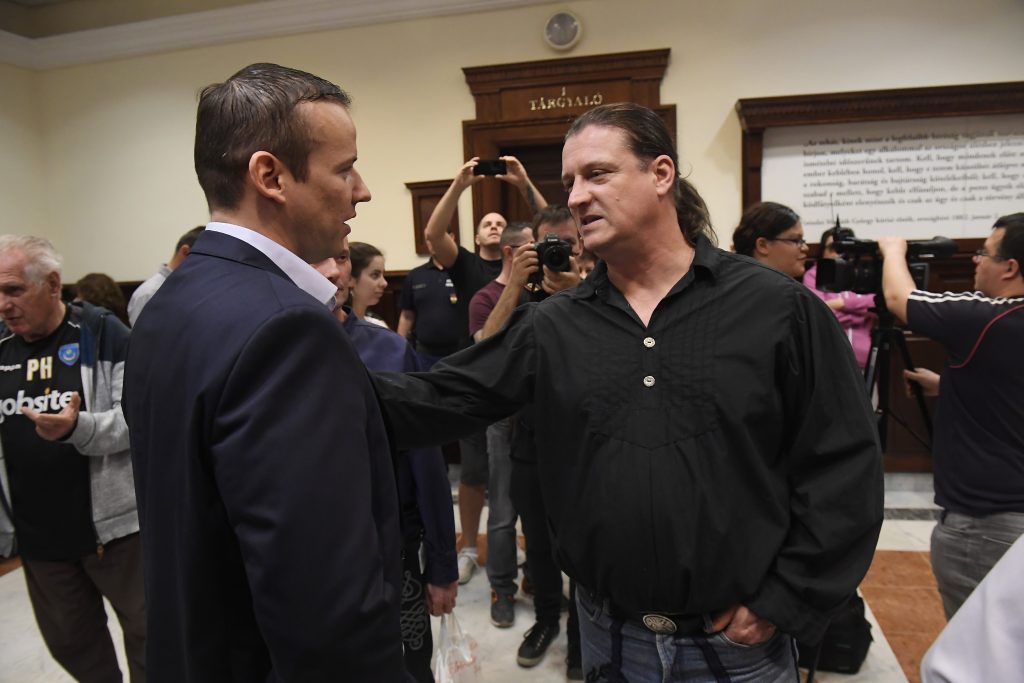
An increasing number of public figures are urging president János Áder to grant clemency for György Budaházy and his accomplices, after the radical right-winger activist had recently been handed a hefty 17-year prison sentence for terrorism in a case that has been ongoing for almost one and a half decades.
Budaházy first gained fame country-wide after he blockaded Budapest’s Erzsébet Bridge in 2002, suspecting electoral fraud after the left-liberal victory at the elections. He had demanded that the votes be recounted, which did not happen.
After former Socialist PM Ferenc Gyurcsány’s ‘Őszöd speech’ was leaked in 2006, he is thought to have been involved in organizing the (sometimes violent) protests, besides other radical activism against the then ruling forces.
According to the charges of the case, Budaházy set up a terrorist organization called the Hungarians’ Arrows (Magyarok Nyilai) to carry out attacks against lawmakers of the then ruling Socialist (MSZP) and Free Democrat (SZDSZ) alliance between 2007 and 2009.
Budaházy and his accomplices had also been charged with throwing petrol bombs at the homes of Socialist and Free Democrat politicians and their parties’ headquarters, as well as throwing Molotov cocktails at gay bars and other locations, such as a ticket office in Budapest’s 13th district. Budaházy’s group is thought to have been behind the beating of a former Socialist politician turned pro-Fidesz TV personality, Sándor Csintalan.
According to the defense, the charges are unfounded. The defendants have all along denied any guilt.
The case has been ongoing for 13 years now, from when Budaházy was first arrested in June 2009. In the summer of 2016, the Municipal Court of Budapest sentenced him to 13 years in prison. Of the 17 defendants, 15 were sentenced to 5-13 years in prison each for terrorist activity. Both the prosecution, Budaházy, and the other defendants appealed the ruling at the time, which eventually resulted in a Budapest appeals court’s dismissal of the ruling and order of a retrial in 2018.
According to the main reasons for the mistrial, the public was wrongly excluded from the trial, which is an essential condition for a fair trial. The court also seriously breached its responsibility to state reasons of guilt, therefore the judgment was significantly unfounded.
In addition, the prosecution’s key witness died more than a year ago, which hardly made the accusations easier to prove.
Anyhow, in a first instance (non-binding) ruling, Budaházy was eventually sentenced to 17 years in prison, with no possibility for parole. Five other accomplices were handed prison sentences of more than ten years, and others of around five years.
Already after the hefty verdict, many began to suggest that he and the other accomplices should receive a presidential pardon.
If we consider that only Budaházy and his fellows were put behind bars as a legal consequence of the [events in the] autumn of 2006, seventeen years after almost a decade and a half is a tough sentence, even if the verdict is otherwise justified. This is where procedural clemency should be applied!”,
lawyer and leftist-green pundit András Schiffer (who previously founded and led the centrist-green LMP party) explained, referring to for example, police officers who shot into the crowd with rubber bullets, causing life-threatening injuries but who mostly were not prosecuted.
Some pro-Fidesz pundits were also urging for clemency.
In addition, two days after the elections, three Hungarian doctors, among them neurosurgeon Dr. András Csókay (who became internationally known when he developed the so-called vascular tunnel technique for the treatment of severe traumatic brain swelling. In addition, in 2020, he and his team successfully separated the Bangladeshi Siamese twins Rabeya and Rukaya) also spoke up, taking a stand by the pardon. Their open statement draws the parallel with several controversial cases where perpetrators were handed a less severe punishment for often horrendous murders, arguing that
“if pardon is not granted, the national sense of justice will be damaged to such an extent that it will not allow for a correct approach to other national issues, either in the past or in the future.”
The cause has certainly gained a new momentum after the radical right-winger Mi Hazánk party, which is linked in several ways to Budaházy, got into the Parliament at the elections. Party leader (and most probably Mi Hazánk’s future parliamentary group leader) László Toroczkai already pleaded that one of their first proposals to be handed in will be a request for the individual pardons for those who “were sentenced on a political basis for the events between 2006 and 2010 (meaning that it won’t be tailored for Budaházy but would be a general act).
According to Hungarian law, the incumbent president (Katalin Novák will soon replace János Áder) has the right to grant individual pardons; however, the President’s decision-making is always dependent on a recommendation by the Minister of Justice or the Prosecutor General.
featured image: Budaházy (right) with Mi Hazánk leader László Toroczkai at one of the hearings in 2018; via Tamás Kovács/MTI